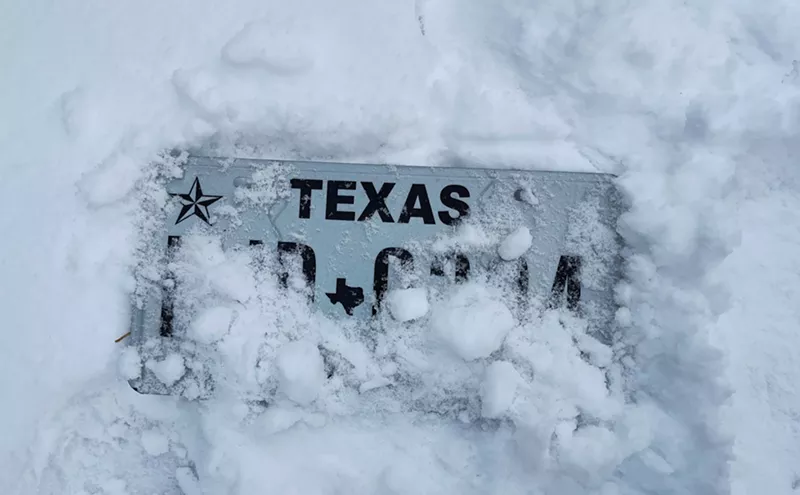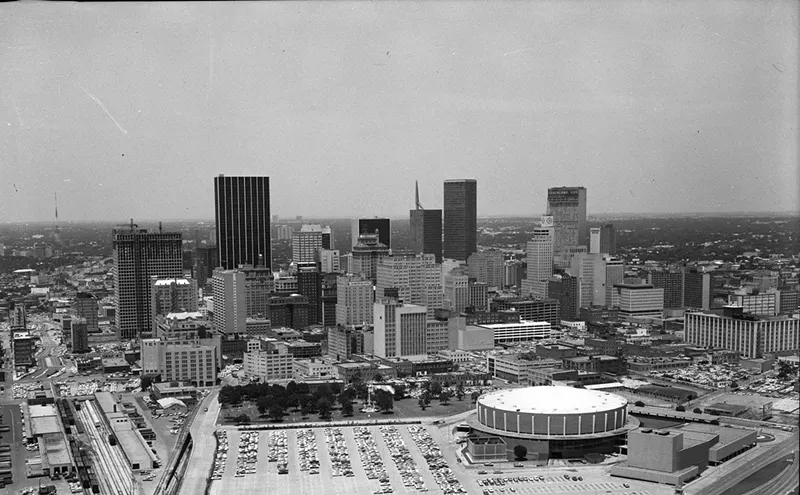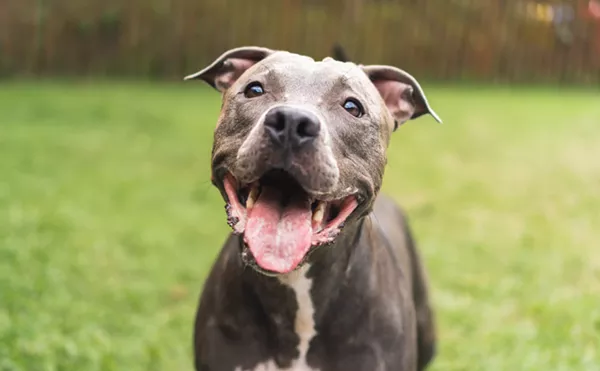Highland Park matrons with their shih tzus, boys in the 'hood with their rotties and pit bulls, suburban dinks with their bubble-blond retrievers--they're turning Dallas into the stink capital of the world, second only to Paris for the number of dog droppings left behind.
"It's a beautiful day out there, and the dogs are stinking it up," says Animal Services manager Kent Robertson. "Everywhere you go you see poop. It's a big problem."
Those of you laughing haven't stepped in the stuff, which is made to outlast man and possibly time itself. When nuclear war strikes, the cockroaches will be feeding on dog droppings. The waste is replete with dead bacteria and proteins, which means it's full of sulfides and nitrogen compounds (think: rotten egg). When a dog strikes that familiar hunched pose, marking his territory, he excretes a heady blend of dead fish and hot ass, making it known to all--human or animal--who owns that piece of sidewalk.
Despite the city's adoption of an ordinance requiring owners to pick up after their pets, or risk fines--$25 for the first offense, $50 for the second and $100 for the third and subsequent infractions--the so-called "pooper scooper law" is an utter failure. It's even been, er, pooh-poohed by many, including Mayor Laura Miller, as being unenforceable. The city has issued zero penalties to offenders this year, which is in keeping with last year's numbers. Zip.
Part of the problem is the dog must be caught "in flagrante delicto" in order for the owner to be issued a citation. Out of the 60,000 calls a year that Animal Services gets, a portion of those are from homeowners sick of watching their neighbor's pet use their lawn for a toilet. Folks who are turned in--about 25 a month--get a warning letter from the animal welfare agency.
If the problem persists, the neighbor can follow up with a formal complaint, take it to a prosecuting attorney, testify in court, be completely in the right, then proceed to live a long, lonely life and die friendless, a social pariah.
Peggy Post, spokeswoman for that bastion of good manners, the Emily Post Institute, says that addressing the issue of a neighbor or acquaintance not scooping a pet's waste is "sticky."
"I recommend you don't get into confrontations with people," she says. "Sometimes people will follow somebody else's lead. If you're cleaning up after your pet, sometimes other people will do the same."
Yet when faced with the immediate insult and a burned lawn, few of us live up to Post's enlightened path, which could take lifetimes to achieve.
"People tell us stories of how they camped out at night or early morning behind bushes with a baseball bat waiting for their neighbor or dog and had a knock-down, drag-out," says Matt Boswell, owner of Pet Butler, a Dallas-based waste-removal company.
Boswell says people need to do the math. A dog dumps on average three times a day. In a week, that's more than 20 piles. Let two weeks go by without picking up a shovel and you have a serious mess. Add a second dog to the mix and you have a brownout.
Boswell sees a kind of disconnect with the way people live. He says people are so busy with work and life inside the home that they conveniently forget to tend to the details.
"We've seen more yards than I can count that have never ever been cleaned," Boswell says. "We walk into the yard and think, 'Oh, my gosh--white trash to the max.' But you talk to people, look at their home and think they're nice people, mature, responsible, friendly. You think, let's get the bulldozer."
"There is just tons of excreta," Robertson says. "If we saw a dog hunkering down, we'd definitely stop and ticket. But most of the time we're running from priority call to priority call."
According to Animal Services, Dallas has an estimated 240,000 dogs and 250,000 cats. Pegasus Park in downtown and Harry Moss Park in North Dallas are notorious scat stations. Animal control officers (there are only six full-time officers for the city) go out in strike teams but end up citing owners for lack of proper registration and leash law violations.
Should there even be a pooper scooper law, then?
Robertson sighs and says, "I think there's some good people out there who're just lazy and don't pick it up. We need to have it in law so people understand it's a serious thing--it's a matter of public health."
Karen Black of Gaston Heights has two medium-size mixes and a Chihuahua named Sophie, whom she carries around in her arms. Black keeps bags on hand and a few in the car in case of emergency. She almost always scoops the larger dogs' turds but not Sophie "Bean" Black's.
"There's no real smell, and they're the size of a Tootsie Roll," Black says. "If I take my eyes off her, I can't find them."
Black loathes the dustbin-style scoopers because the metal is streaked and stained with fecal matter. Bags, she says, are cleaner and more efficient. But there is the indelicacy of stooping to pick up crap and the sensation of feces through the plastic.
Boswell, who claims to be No. 1 in the No. 2 business, says he's heard all the excuses, even that excrement is fertilizing the lawn. It does not, and it can't be composted. The protein-based excrement burns the lawn and typically takes more than a year to disintegrate. Rain and running sprinklers, he says, only worsen the matter by "melting" the piles, making them more difficult to extract.
A self-proclaimed "poop Evangelist," Boswell says that cleaning up the stools protects dogs, kids, neighborhoods, shoes and oneself.
"Don't dump in Dallas. We all live downstream," says Frances Verhalen, a senior manager with the city's storm water management division.
Verhalen says people assume that it's OK for dogs to defecate in public parks but don't realize that the feces doesn't go away.
A child might wave bye-bye to his poop as it swirls down the commode and makes its way to various treatment plants that rid waste of harmful bacteria. But poop in gutters, sidewalks, lawns and parks washes right into the storm drains and is carried untreated to creeks and water sheds where a bacteria soup simmers in the warm, shallow waters, especially in summer. Additionally, high concentrations of nitrogen and phosphorus feed algae, which chokes the oxygen in water and leads to fish kills and dead or dying water systems.
Dallas has been lucky so far, Verhalen says. There have been no major algal blooms and no dead zones simply because of the abundance of open spaces. "It's important to remember that we're an urbanized area," she says. "We've concentrated all our natural processes into a small area. What we do and how we do it will affect our neighbor two blocks over."
There are a number of excuses for sidestepping poop patrol. Dog owners "forget" their plastic bags. Hey, it's a natural function--a bear in the woods and all. They make distinctions between the size and consistency of the waste and whether it was laid on-the-path or off-the-path, on sunny days or rainy days. (It washes away, right? Wrong.)
There are alternatives to plastic bags and tiny scoopers to aid this necessary evil. "There are some rather civilized contraptions now in practically any pet store," Peggy Post says. "Scoopers on sticks so you don't have to bend over. There are ways to make it at least a little more dignified for some people."
For people worried that raising the issue with a friend or neighbor might get their names crossed off the pool party list, Post recommends lodging anonymous complaints with a neighborhood association that can run a general reminder for the public. Homeowners might also consider posting signs such as New York City's "Curb Your Dog."
This is exactly the approach Gaye Martin, publisher of the Swiss Avenue Historic District newsletter, The Occasion, took last month. Martin included a reminder to 250 of her gentle readers that the city has a pooper scooper law.
"Swiss Avenue has a beautiful median, but you can hardly walk through it without stepping on--stuff," Martin says. "I'm trying to raise the collective consciousness. We lived in Switzerland for a while where they have boxes you get bags out of and can dispose of the waste right there. I just don't understand why people don't pick it up. It seems barbaric."












